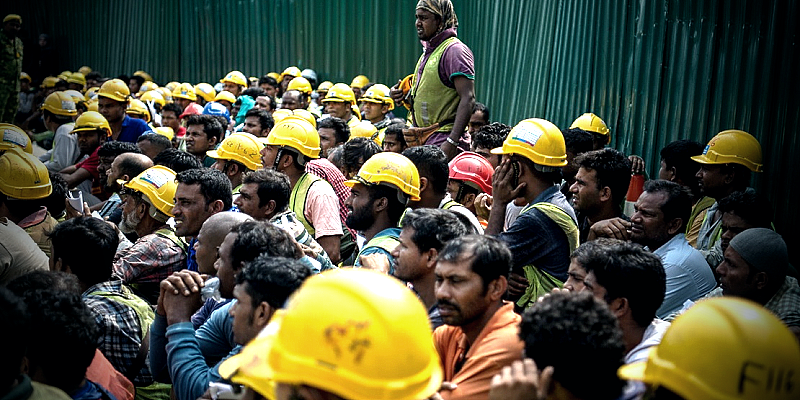
Anwar Ibrahim made a one-day official visit to Cambodia.
During his short visit, he witnessed the signing of a Memorandum of Understanding (MOU) between the Malaysian and Cambodian governments regarding recruitment, employment and repatriation of Cambodian workers in the domestic and formal employment sectors.
As at January 2023, there were 1,459,196 foreign workers employed in manufacturing, construction, service and agricultural industries. Over half of these come from Bangladesh, Indonesia and Nepal.
Unofficial estimates indicate there are more than 2 million illegal foreign workers in Malaysia who have either overstayed their work permits, come into Malaysia on tourist visas, or been smuggled into the country by cartels.
World Bank estimates are double this figure, so one must consider how the Malaysian economy could continue to operate without foreign workers.
With the difficulties of employing locals to work in many industries, it is of paramount importance that companies operating within Malaysia are able to recruit a sufficient supply of able and capable low+skilled foreign workers to maintain existing and expand production upon demand.
Potential stall of economic growth
Without a plentiful supply of foreign workers this year, Malaysia’s GDP estimate of 4.5 percent will not be met.
The Federation of Malaysian Manufacturers (FMM) has been complaining of the cumbersome bureaucratic procedures for recruiting and employing foreign workers for a long time.
However, the announcement that the immigration department will stop taking new applications for work permits from March 18, and until 995,396 approved places across various sectors have been filled, no more calling visas will be issued.
This has been met with criticism from many quarters, as companies which don’t have quotas will not be able to employ foreign labor if their demand increases. This could potentially cripple many companies.
US Customs ban on import of rubber gloves
US Customs back in 2021 banned the import into the United States of rubber gloves from a number of Malaysian manufacturers.
This was the result of allegations made by human rights groups over poor pay and conditions of foreign workers in these companies.
US Customs found that the working conditions in Malaysian factories failed to meet seven of 11 Forced Labor Indicators (FLI) set out by the International Labor Organization (ILO).
A gangster industry
The foreign worker supply industry is full of exploitation along the supply chain, from recruitment right through to employment.
This industry has attracted companies, agents and brokers which don’t appear to operate with strong codes of ethics.
The exploitation of foreign workers starts pre-recruitment. Potential workers are recruited by agents or brokers who arrange their employment in Malaysia.
Workers are charged for their airfares, food and accommodation, medical tests, local transport and administration fees. This calculates to something between US$7,000-20,000, depending upon the job.
Most must borrow these “fees” at high interest rates to pay the agents, and it can take between six and 18 months to recuperate these recruitment costs.
When the workers finally arrive in Malaysia, they are often sent to different jobs, paying less than what they were promised.
Some unscrupulous employers charge their workers for accommodation, uniforms, insurance, food and accommodation, and sometimes unexplained items cut out of their monthly wages.
Workers’ passports are taken away in order to prevent them from leaving.
Malaysia will not be able to free itself of foreign labor. The country is still low-cost and low-skilled in many sectors of the economy.
Often the workers’ direct supervisors treat them with lack of respect. Some are deigned days off and sick leave. Accommodation is sometimes substandard.
There is usually no independent persons visiting the workers to check if they are alright and have any complaints. Their embassy representatives almost never visit.
There is no provision under Malaysian law for foreign workers to join local trade unions.
If there are any document or immigration issues, the immigration department usually takes the workers into custody at an immigration detention center, even though it is the responsibility of the employer to have the correct documentation for the workers.
For those undocumented, or in Malaysia illegally, foreign workers fall prey to government officials.
Some may be forced to pay bribes, or they will be arrested, fined, jailed and/or deported.
They are usually underpaid, treated poorly, sometimes sexually abused, and forced to work seven days a week.
Foreign workers tend to be treated as criminals by the authorities. However, they are really the victims of unscrupulous agents and employers who exploit them.
Reforms are necessary
The freezing on work visa applications from mid-March indicates a lack of coordination between different ministries.
The home, human resources and economy ministries appear totally uncoordinated. This poor coordination could potentially cause Malaysia to miss its 4.5 percent growth projection this year.
Malaysia will not be able to free itself of foreign labor. The country is still low-cost and low-skilled in many sectors of the economy.
To realistically introduce Industry 4.0 as a solution will take decades, where some industries are just not presently suited.
With local people unwilling to take many jobs across all sectors, foreign workers are the only solution.
Foreign workers will be required in agriculture, food and beverage, services, tourism and manufacturing sectors for many years to come.
MSMEs operating within the informal sector will also require foreign workers, where they are unable to employ locals.
Given the above, Malaysia must streamline the procedure, work hard to eliminate corruption, work on preventing exploitation of foreign workers along the supply chain, and improve foreign workers’ pay and conditions.
These are the stark facts if Malaysia is to keep its growth trajectory. A reliable and motivated foreign work force is required.
This is in the national interest to create safeguards.
Malaysia must accept that there will be a long-term two-tier labor market.
Low pay and poor conditions for foreign workers also mean local companies won’t offer locals anything better, unless pay and conditions are improved for foreign workers.
Low wages to foreign workers are keeping downward pressure on wages for Malaysian citizens. This is a very deep issue Malaysia’s labor economists must think critically about.
Eliminating exploitation will prove to be a massive challenge.

(Murray Hunter has been involved in Asia-Pacific business for the last 40 years as an entrepreneur, consultant, academic and researcher. He was an associate professor at Universiti Malaysia Perlis.)
ADVERTISEMENT
ADVERTISEMENT








































